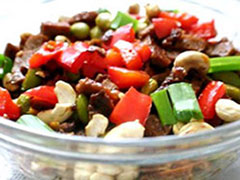Improve your mood with these foods and eat these fruits, vegetables and grains to increase energy, decrease stress-
Improve mood
* For protein plus omega-3 fats in one great package
Examples: anchovies, black cod, catfish, clams, crab, flounder, halibut, herring, lobster, mackerel, oysters, rockfish, sablefish, salmon, sardines, scallops, shrimp, trout, tuna
* Carbohydrates
Examples: whole grains, beans, potatoes and root vegetables, winter squash, all fruits and vegetables
* Tryptophan and carbohydrates in one great package
Examples: milk and dairy products — lowfat/nonfat milk, yogurt, kefir, smoothies
* Antioxidants
Examples: fruits, vegetables, grape juice, green tea and oolong tea
* Crunchy foods (stimulate the secretion of serotonin by the trigeminal nerve)
Examples: popped corn, apples, carrots, celery
Decrease or prepare for higher stress, anxiety, anger, frustration
* Healthy fats (monounsaturated and polyunsaturated)
Examples: olives, olive oil, nuts, seeds, nut and seed butters, nut and seed oils, avocados, fish
* Whey protein
Examples: milk and dairy products — lowfat/nonfat milk, yogurt, kefir, smoothies, whey protein powder
* Tryptophan and B vitamins
Examples: turkey, lean pork, beef, chicken
* Magnesium (decrease headaches)
Examples: nuts, beans, whole grains, spinach
* Ginger (decrease headaches, pain relief)
* Anti-inflammatory effects (bioflavonoids)
Examples: pomegranates, grape juice, soy, kale, green beans, apples, citrus, prunes.
Also for other anti-inflammatories that they contain: pineapple, fish, wheat germ
* Zinc and iron (boosts immune function)
Examples: lean meats, eggs, seafood, whole grains
Boost physical energy and alertness
* Calories: Eat enough of a variety of all feel-great foods.
* Water: Stay well hydrated for your body and your brain.
* Carbohydrates plus protein: Fuel your muscles and your brain.
* Phospholipids from eggs and soy: Allow for nutrients to pass into the brain cell, keeping your memory and brain function sharp.
* Fiber from whole grains, flaxseed, apples, berries and beans. Keep blood sugar levels even for sustained energy all day.
* Caffeine: 1-2 shots or cups before noon or before exercise will give you a great pick-me-up that will aid your alertness and exercise. Too much, or after noon, will backfire and make you feel lousy. Use other energy boosters after noon, and get plenty of rest.
Eye-Opener Smoothie
"The Good Mood Diet"
Makes 1 serving
INGREDIENTS
• 1 cup fat-free milk
• 1 Chai tea bag
• 14 grams protein from vanilla isolated whey protein powder
• 1 teaspoon Splenda
• 1/8 teaspoon nutmeg
• 4 ice cubes
DIRECTIONS
Heat the milk in the microwave and pour over the tea bag; steep 5 to 8 minutes. Discard the tea bag. Cool the milk in the refrigerator for 20 minutes or even overnight. Pour the milk into a blender and add the protein powder, Splenda, nutmeg, and ice cubes. Blend 1 minute, until smooth.
(food tips from Dr. Susan Kleiner, author of “The Good Mood Diet.” )







